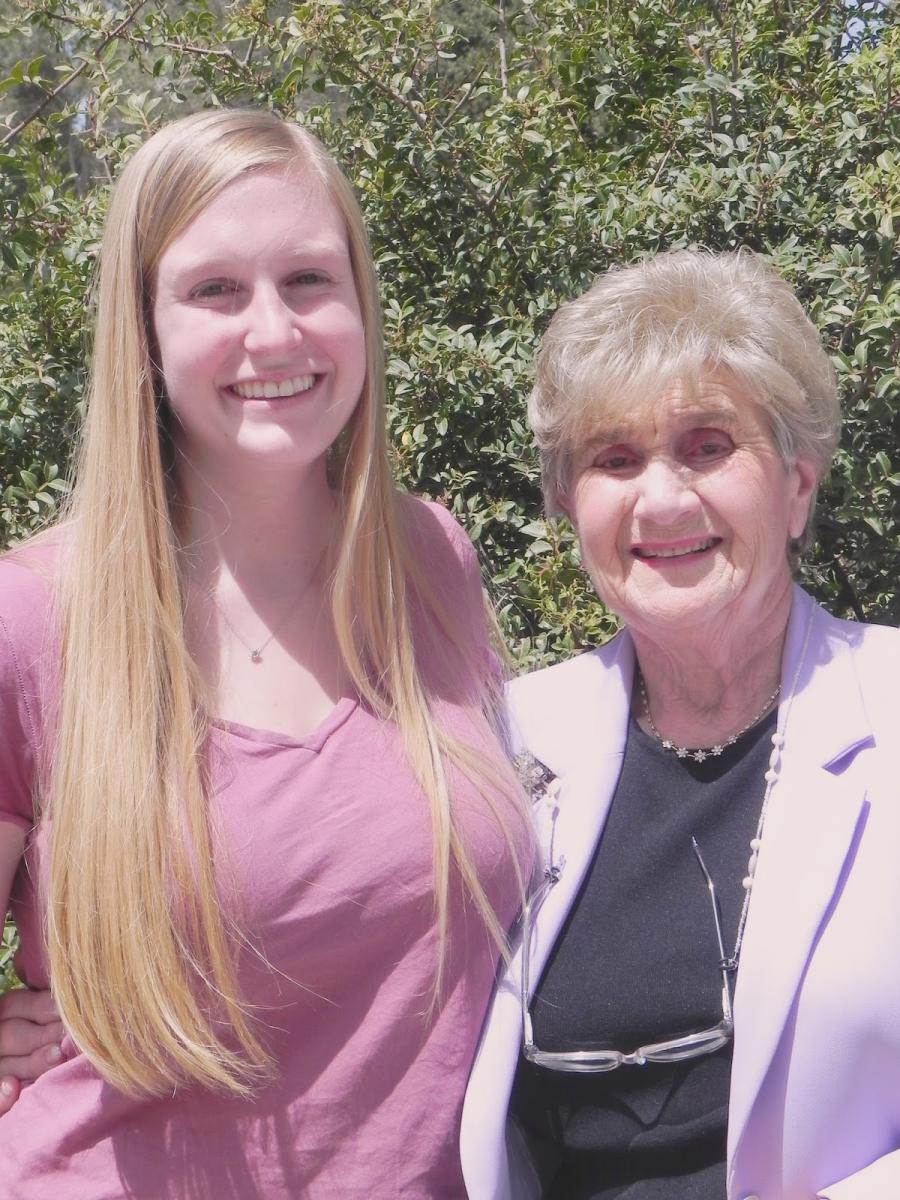

A few weeks ago, I met Rina Quint, a child survivor of the Holocaust. That morning I had the privilege of hearing her story, and through the Twinning program at Yad Vashem I was able interview her personally. My name is Heather Gillies, and I'm a student from San Diego studying for a semester at the Rothberg International School at Hebrew University. In these few months that I have been living in Jerusalem, I took the opportunity to volunteer at Yad Vashem, and wanted to develop a personal connection with a survivor.
Born in Piotrkow, Poland, not far from Krakow, Rina lived in the Ghetto with her two brothers and parents. One day all 2,000 Jews were rounded up in the small local synagogue. Foreseeing immediate danger, a man that Rina called "uncle" told her to run away. She tells me that she doesn't understand why a young child of maybe 5 or 6 would let go of her mother and run away, but her life was momentarily spared as she escaped the synagogue and her entire community was sent to Treblinka. She never saw her family or any one of those people ever again. Her father, meanwhile, worked at a glass factory at a work camp. She was brought to him, and in order to survive Rina's father changed her identity to that of a ten year old boy. Rina worked by bringing water to the workers, and remembers the Nazis' dogs that stood by watching, whom were randomly unleashed onto any unsuspecting worker. A worker who was injured by the dogs was considered useless, and immediately shot by the Nazis. Although Rina has struggled to piece together the reality of her past and find truth in her memories, she says that some things are unforgettable. The vicious demeanor of these dogs, and the smells of death and disease are some of these things that are ingrained in her memory.
On one fateful day, Rina and her father were rounded up with many others from the glass factory and sent to Bergen-Belsen. Her father entrusted her care to a school teacher he had met, and handed her pictures of her family. Thinking that Rina was hiding a jewel in her hand, a Nazi soldier took the pictures and ripped them, tossing them into the snow. To this day Rina cannot remember the faces of her family. Her father was sent to Buchenwald and she stayed with her "new mother" in Bergen-Belsen. They slept on the stone cold floor with rats and lice, ate soup made from dirt, snow, and turnips, and witnessed the deaths of thousands of people. She remembers being able to understand when death was coming. One day, new soldiers showed up in the camps. People who could barely walk or speak were now running and shouting, "You're free, you're free!" But Rina explains that she didn't really understand what freedom meant. She was liberated from Bergen-Belsen with Typhus and Diphtheria, and was sent to a DP camp in Sweden where she recovered. Every day a Christian couple came to take care of her and bring her toys and candy. They offered to adopt her one day, but the people around Rina told her that she was Jewish and that she belonged in Palestine. She had no idea what it meant to be Jewish. She was transferred to another DP camp where she met Anna, her next mother. When Anna's own daughter died, Rina took her place as Anna's daughter, and boarded a ship to America.
During her life in the United States, she learned how to be Jewish and what a real childhood was like. No one asked her about the Holocaust. Rina remembers that one day Anna disappeared. She came back in a black car that people around her called a hearse. There was a grave dug for her, and a ceremony, and everyone around her was grieving. Rina didn't understand why everyone was crying over the death of one person. In the camps, so many died and no one cried. Rina was eventually adopted by a family in Brooklyn – her sixth and final mother. She went to school, graduated, and eventually moved to Israel with her husband, and volunteers at Yad Vashem.
After Rina finished telling her story, I sat down with her to ask some questions of my own. Like me, living in Israel has been a source of strength and life for her. She is proud of her adopted mother who lived to be 100 years old, and of her 22 grandchildren, three of whom attend school at Princeton, Harvard, and Stanford. She is proud of the binder of documents she has amassed: her birth certificate, her medical records, pictures of her old apartment and synagogue. This is proof to herself that her story was not imagined – everything she remembered was true - and proof to the deniers who claim that these atrocities never happened. She tells her story with grace and ease, fully understanding of its significance in the collective Jewish narrative. When I ask her if she connects with the Jewish people and with Israel, she answers without hesitation: "Absolutely." She inspires me to be better – to help foster a greater future in which Jews no longer have to live in fear. I listened to her explain how she didn't know how wonderful life could be until she was free with a loving family. She said, "Before I was liberated, I thought that everyone slept on the floor, and didn't know that people got up in the morning, showered, and went to the kitchen to decide what to eat for breakfast." These little things that we take for granted every day were luxuries for so many survivors during the Holocaust. Survivors like Rina teach us to appreciate the blessings we have: our families, our homes, and our heritage. I am so fortunate to have shared in this experience with Rina and to have heard her story of survival and life.










